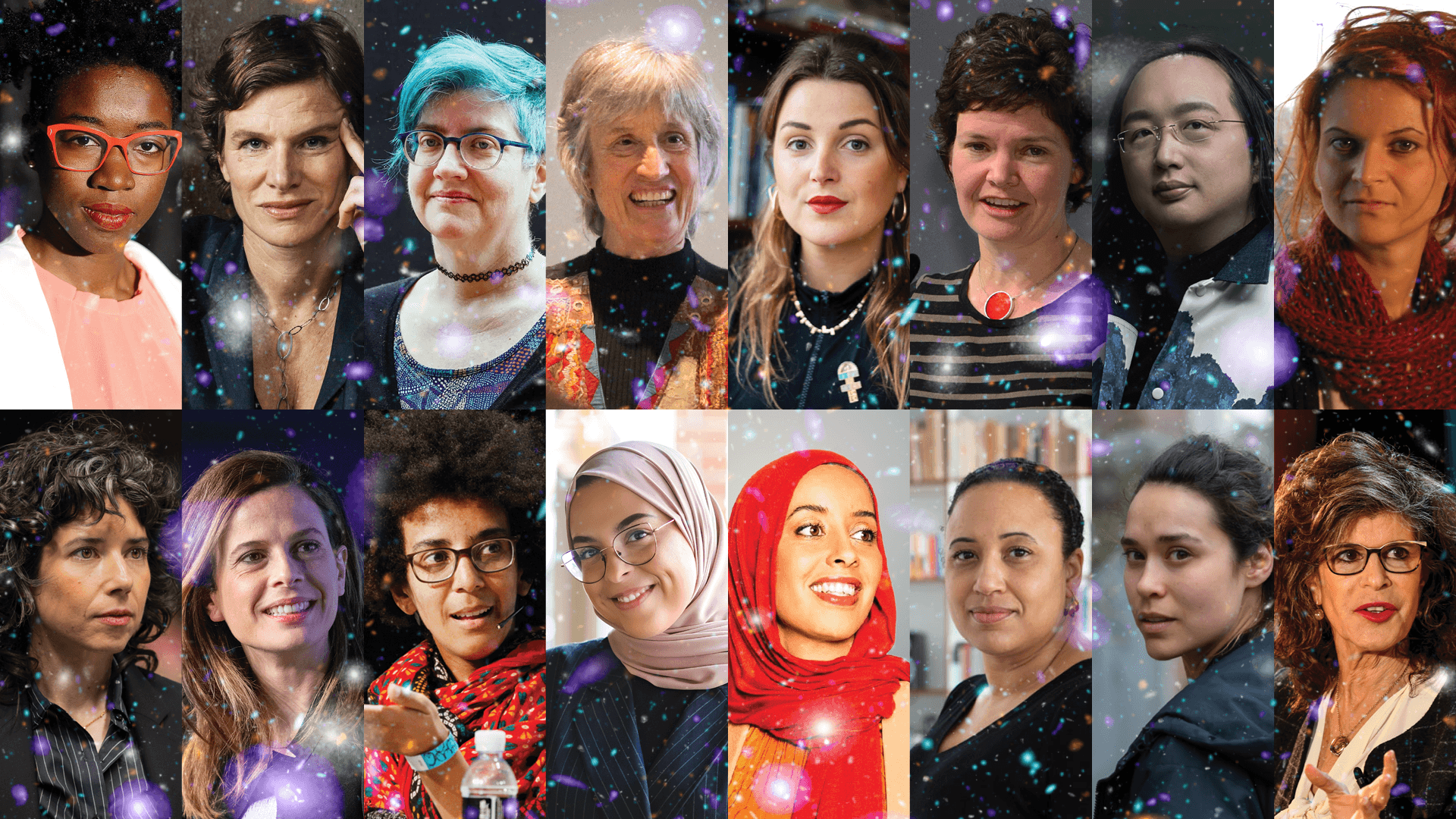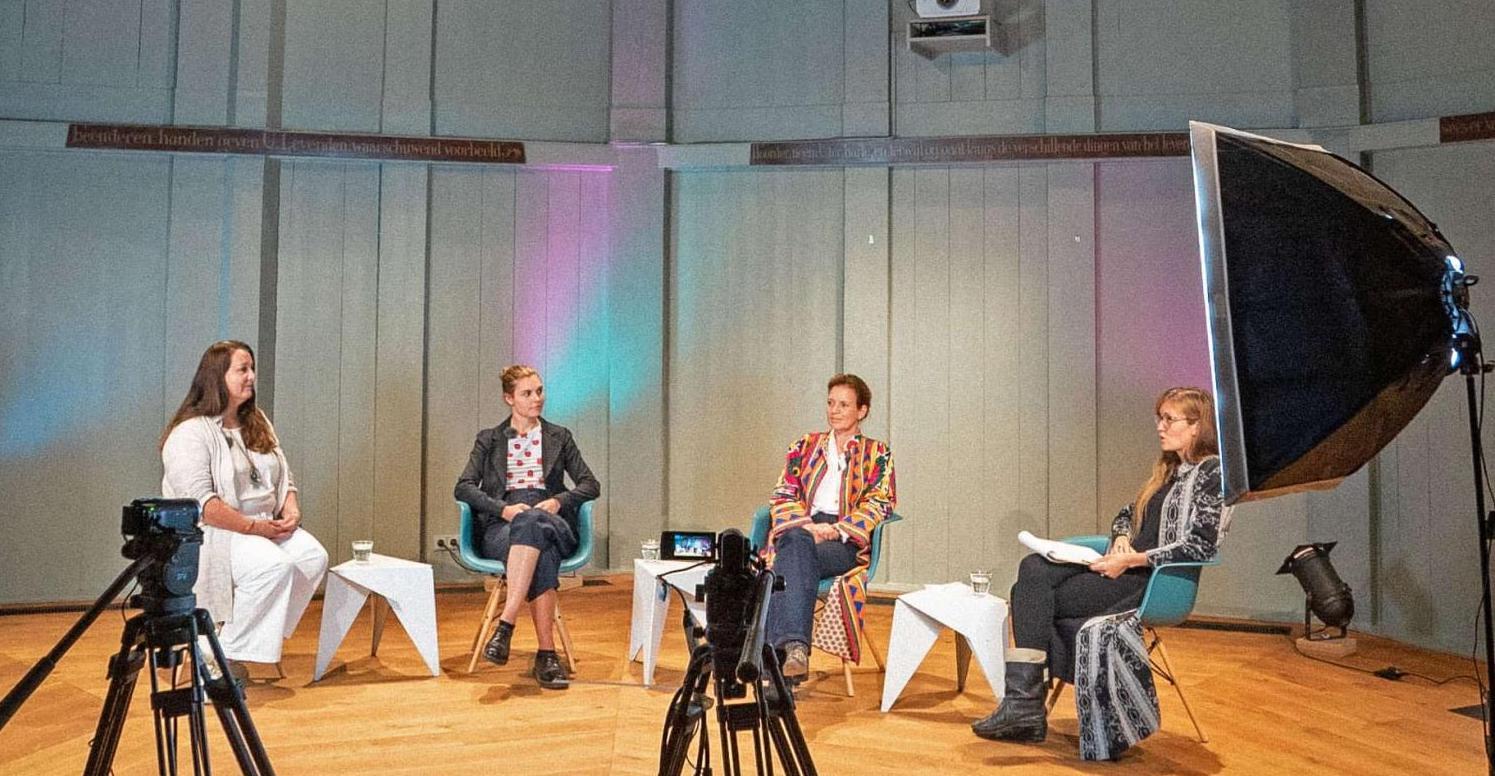Waag Futurelab explores how we can engage everyone in shaping an open, fair and inclusive future. Much of our work is nurtured, inspired and shaped by women. On International Women's Day, we like to list some of these women (in no particular order). They inspire us, and who knows, maybe they can inspire you too.
Kate Raworth is the creator of the Doughnut Economy model that reasons from human and social need of everyone, within the limits of the planet. In the Ted Talk on Youtube, she explains in 15 minutes how simple and effective it is.
Mariana Mazzucato is an inspiring economist who shows that government plays a much bigger role in innovation than previously always assumed. Her latest book sets her sights on the consultants around government. 'It's the government throws out the external consultants and goes back to doing it itself,' she told Government Now.
Donna Harraway is an influential feminist thinker. She inspires with her groundbreaking ideas on technology, ecology and the relationships between humans and non-human beings. She is also author of the Cyborg Manifesto and of our motto: 'Technology is not neutral. We're inside of what we make, and it's inside of us.' Based on Harraway's Staying with the Trouble, VR collective Polymorph developed an installation. Read the interview here.
Meredith Whittaker is president of the Signal Foundation, but also known for her research through her AI Now Institute. She played a crucial role in the Google Walkout, in which over 20,000 employees of the organisation took part in a global strike to protest against the company's handling of sexual harassment issues and employees in general. Whittaker previously spoke about the dangers of AI.
Oumaima Hajri is a board member of PublicSpaces and a researcher and lecturer at the Hogeschool Rotterdam, where she researches how AI can be applied responsibly. She is also currently studying AI Ethics & Society at the University of Cambridge. We spoke to her about how and whether AI can be used responsibly in the Planet B Podcast.
Siri Beerends is a cultural sociologist and at media lab SETUP she researches the social impact of digital technology together with artists. With her journalistic approach, she stimulates critical debate on artificial intelligence and increasing datafication. Her PhD research (University of Twente) deals with authenticity and the question of how AI reduces the distance between humans and machines. In the Planet B Podcast, we talked to her about the 'promises' of AI.
Hanane Abaydi is a corporate activist, external knowledge circle member of The Hague University of Applied Sciences' Change Management Lectureship and co-founder of the inclusive primary school Waldorf aan de Werf. She advocates for more understanding of activism in organisations and a more diverse worldview in education. 'We need to take activism more seriously,' she told us in the Gamechanger blog.
Naomi Appelman is president of the Racism and Technology Center and PhD researcher at the University of Amsterdam. She helped show that the face detection algorithms in the software used by the Vrije Universiteit to check home exams may be racist. She explained in the Planet B podcast how they proceeded in their research.
Ruha Benjamin is professor of African American Studies at Princeton University, author of acclaimed books such as Race After Technology and founder of the Ida B. Wells Just Data Lab. She examines the social impact of science, medicine and technology, focusing on the links between innovation, inequality, health, justice, knowledge and power. Benjamin is also described as an advocate for technical justice. Benjamin delivered the opening keynote of the PublicSpaces Conference 2023. Watch the lecture.
Kim van Sparrentak is a member of the European Parliament for the Green Left. Here, she was involved in, among other things, the AI Act, the initiative proposal on addictive design of online services and makes a case for reducing the power of Big Tech through the development of laws and regulations. This year, van Sparrentak is hosting Waags annual State of the Internet lecture.
Julia Janssen is an artist and designer. With her work, she tries to create awareness of the impact of technology and digitalisation on society. She was one of our guests at The State of the Internet 2020 with her installation 0.0146 seconds. In 0.0146 seconds, she pays attention to the fact that you can accept as many as 835 privacy policies in one click, while it would take hundreds of hours to read all of them. She printed out all the privacy statements to read them together - during The State of the Internet, GroenLinks MP Kathalijne Buitenweg and Waag director Marleen Stikker, among others, read along with her.
Cathy O'Neil is an American mathematician. She is author of the weblog mathbabe.org and several books on data science, including the well-known Weapons of Math Destruction. She describes algorithms as "opinions embedded in code" and argues that the era of the end of trust in big data has arrived. In her Ted Talk, she explains why.
Joy Buolamwini is a researcher at MIT Media Lab, who discovered that much facial recognition technology does not respond to her skin colour. She was an important voice in the documentary Coded Bias, which we were invited to show at Waag. She founded the Algorithmic Justice League and continued her fight. Her much-shared Ted Talk can be seen here.
Shoshana Zuboff is a writer and creator of the pioneering term 'Surveillance Capitalism' in which she describes the user as a commodity being traded. She calls this the 'new economic order' and 'an expropriation of crucial human rights best understood as a coup d'état from above'. Broadcaster Human spoke to her about her book and how we can break free from Big Tech.
Audrey Tang is a Taiwanese computer scientist who ended up in politics from the open source and free software movement. Now she is Taiwan's Minister of Digital Affairs, and is described as one of the "ten greatest Taiwanese computer personalities". In August 2016, Tang was invited to join Taiwan's Executive Yuan as minister without portfolio, making her the first transgender person in the top executive cabinet. Marleen Stikker was a guest on her podcast, discussing the internet and citizen influence on decision-making (Youtube).
Francesca Bria is an innovation economist and expert on digital policy, working at the intersection of technology, geopolitics, economics and society. She is an honorary professor at the Institute for Innovation and Public Purpose at UCL in London. Together with Bria and others, Waag worked on DECODE, for a secure and fair digital identity for all Europeans. Watch her presentation on data sovereignty.
Tamar Sharon is Professor of Philosophy, Digitisation and Society and chair of the Department of Ethics and Political Philosophy and co-director of the Interdisciplinary Hub for Digitisation and Society (iHub) at Radboud University. She researches how digitisation destabilises public values and how best to protect them. She is a member of the EC's European Group on Ethics in Science and New Technologies. During the PublicSpaces conference '22, Sharon participated in several sessions.
Timnit Gebru is an Ethiopian computer scientist. She lost her job at Google after drawing the company's attention to the inequalities built into AI. She co-wrote one of the most influential articles on AI in recent history, in which she argued that the biases so present in large language models are not an accident, but the result of a deliberate choice to put speed over safety. Time counted her among the 100 most influential thinkers on AI.
Nani Jansen-Reventlow is an award-winning human rights lawyer specialising in strategic litigation at the intersection of human rights, social justice and technology. She is also founder of Systemic Justice, a new organisation that aims to radically transform the way the law works for communities fighting for racial, social and economic justice. In 2022, she addressed The State of the Internet on radical equality and technology.


